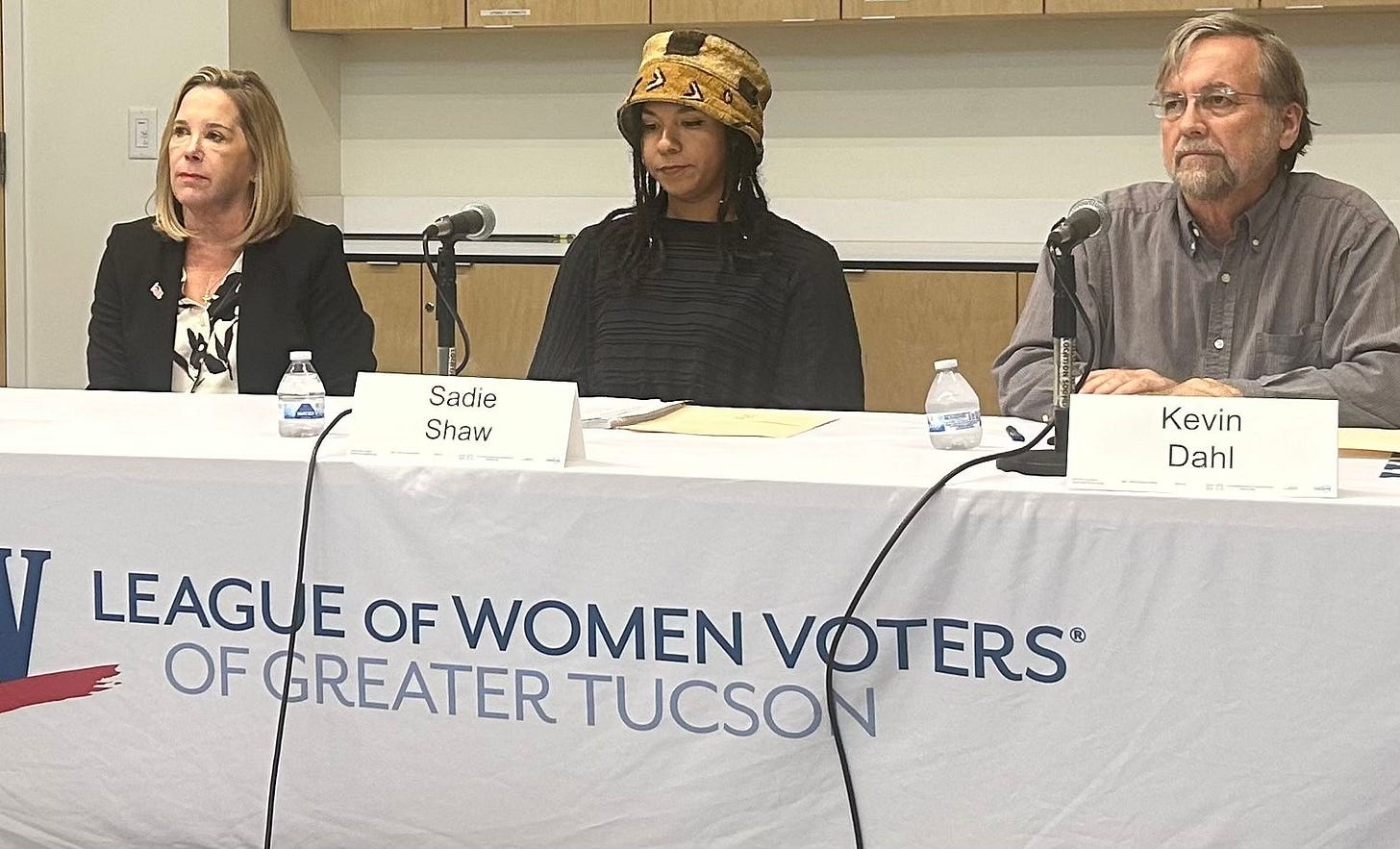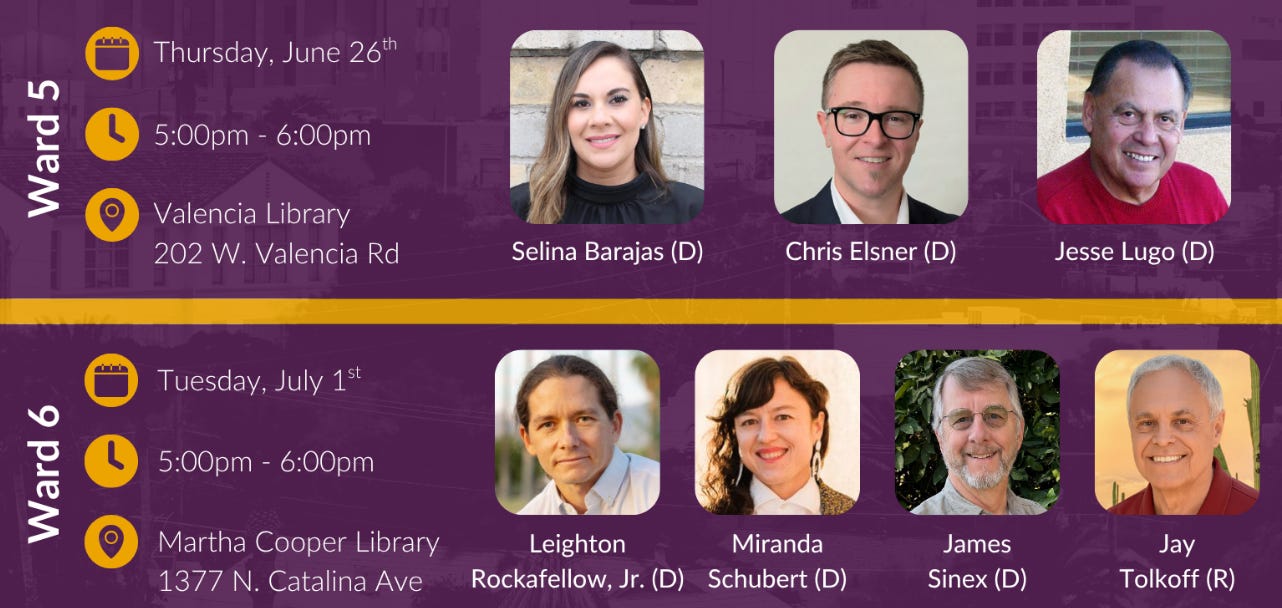The fight for Ward 3
Partisan lines break down … Kari Lake’s in the House … How will you celebrate National Asteroid Day?
How do you cover half of a Tucson City Council debate?
The League of Women Voters of Greater Tucson organized a series of debates ahead of the August primaries, but there was a wrinkle when it came to Ward 3.
Sadie Shaw, a member of the Tucson Unified School District Governing Board, is challenging freshman Councilmember Kevin Dahl in the Democratic primary. But Republican Janet “JL” Wittenbraker, who ran for Tucson mayor in 2023 and a seat on the Pima County Board of Supervisors in 2024, is running unopposed in the GOP primary.
The League invited Wittenbraker anyway to last Saturday’s debate. It made for an interesting discussion, or at the very least, a preview of the general election.
The old adage of the enemy of my enemy is my friend rang true for most of the debate as the challengers, Shaw and Wittenbraker, largely put aside their vast political differences and ganged up against the incumbent, Dahl.
The hardcore Republican Wittenbraker and the liberal Shaw both separately complained that Dahl’s office wasn’t open in the afternoons after 1 p.m. (or at night, or on weekends). Dahl responded that his entire office puts in a full day beyond the walls of the Ward 3 office.
They also teamed up against Dahl over the city’s unique election system — which is dictated by the city charter — that allows city voters to vote for all of the city council members in the general election, not just in their ward.
Dahl defended the practice, noting he votes on the annual budget and passes ordinances for the entire city, while Shaw and Wittenbraker found flaws in the system for both parties.
The trio clashed over how to address increasing traffic issues in the city, with Dahl defending the status quo and noting the Tucson Police Department has a special task force that uses drones to combat street racing.
Wittenbraker said if elected, she’d push TPD for new, stricter laws and more stringent enforcement of existing laws.
Shaw went a step further, saying she would support the return of red light cameras.
The biggest question of the debate was the recent Council decision to criminalize sleeping in washes, where Dahl was the lone dissenting vote on the Council.
Finally, the two Democrats found something they could agree on: They disagreed with the largely liberal Tucson City Council’s decision to criminalize sleeping in washes.
Dahl said the city already had laws on the books to give officers the ability to clear out washes, and noted that the city regularly clears out washes ahead of monsoon season.
“We have laws that prevent people, that we can remove people from washes when they're doing bad things, when they're starting fires, when they're too close to a school, to a business, to a residence. We move people out of washes regularly right before monsoon season because it's dangerous. We didn't need to add this criminal element,” Dahl said.
Shaw said she would have also voted no.
“I think it's an inhumane practice and it's gonna put neighbors in a really tough situation. In Sugar Hill, when they cordoned off the park to move the encampments, those folks moved into the alleyways of our neighborhood, moved onto the sidewalks. And honestly, that creates a difficult situation for residents,” Shaw said.
That left Wittenbraker, the Republican, as the lone supporter of the policy, putting her in agreement with the Democrats on the Tucson City Council, minus Dahl.
”We're not helping people by just ignoring the problem again. We have a fentanyl problem. We have a mental health crisis. And we need to deal with the situation with compassion and care. There is nothing compassionate by allowing someone to suffer alone, in our washes and in our parks,” she said.
Have you ever actually been to a political debate? They’re kind of fun.
And there are two more City Council debates coming up in the next week.
Come say “hi” to Joe! He’ll be there.
And help us be in the room where it happened by becoming a paid subscriber.
Fight the power: A resident of Flowing Wells Mobile Gardens got a shock when he looked at his electric bill. What usually cost him about $60 a month came out to more than $400. When he tried to dispute the charges, he came up against a widespread billing tactic that can lead to evictions for mobile home residents, the Arizona Luminaria’s Yana Kunichoff reports.
Tragic work: As the deadliest stretch of summer arrives, No More Deaths volunteers were back out in the desert placing water jugs for migrants in the Altar Valley southwest of Tucson, the Tucson Sentinel’s Adrian O’Farrill and Paul Ingram report. The local aid group has been putting water and food on migrant trails for more than two decades, ever since migrants started perishing in large numbers as border enforcement policies hardened. The remains of more than 4,000 migrants have been found in Southern Arizona since the early 2000s.
Making sausage: Gov. Katie Hobbs vetoed two budget proposals yesterday as lawmakers try to come up with a workable budget before the state government shuts down on Tuesday, per our sister newsletter, the Arizona Agenda. The budget that GOP senators negotiated with Hobbs weeks ago is back on the table, but the Freedom Caucus doesn’t like that proposal and neither do some Democrats who object to funding for immigration enforcement.
The only thing we fund at the Agenda is local journalism. Help us keep the lights on long after Tuesday by subscribing today!
Venturing farther afield: Now that the U.S.-Mexico border is quiet, Border Patrol agents are roaming farther into the interior of the United States, the Associated Press reported. Agents in the Yuma area, where they’re averaging just four arrests a day, worked with ICE officers in Philadelphia last week, and Border Patrol agents from El Centro, California were in the thick of the crackdown in Los Angeles.
Bit by bit: The long-awaited passenger train route between Tucson and Phoenix took a small step forward, KJZZ’s Nick Karmia reports. The Federal Railroad Administration approved the Arizona Department of Transportation’s budget and scope for station locations, ridership and infrastructure along a 160-mile corridor. Planning is expected to take several years, and then somebody has to pay for the construction.
Gone, but not forgotten: A mural that hung in the Wells Fargo building won’t be there when the county library moves in, Arizona Daily Star columnist Tim Steller writes. The 122-foot-long mural was a fixture at the bank building since 1958, but Wells Fargo had it removed last year to make sure it was preserved properly. That might help county officials avoid answering questions about why a mural of a Spanish conquistador would be hanging in a public library, but it still deserves a spot somewhere downtown, Steller writes.
We’ve never left the atmosphere, so former astronaut and U.S. Sen. Mark Kelly probably has a deeper affinity for asteroids than we do.
And he’s trying to create a National Asteroid Day to “educate the public about the role of asteroids in our solar system, their potential for resource utilization, and their significance in understanding the origins of the universe.”
The space rocks are a great source of knowledge as we try to unravel the 14 billion-year-old mystery of how the universe formed.
It’s also possible Kelly is trying to drum up support for long-term funding of the University of Arizona-led OSIRIS-APEX mission, which is following the trail of Apophis — an Empire State Building-sized asteroid. NASA might cut funding for the project, even though the massive rock is expected to pass in between the Earth and some man-made satellites in about four years.
Experts say Apophis won’t hit the Earth, but we’ve still got our fingers crossed that we don’t end up celebrating an asteroid that vaporizes us.











